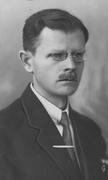He was born in a landowning family in Borokhiv near Lutsk in Volhynia. In 1902, he finished grammar school in Kamianets-Podilskyi. In the same year, he also began legal studies at the University of Warsaw, and from 1905 to 1907 he studied law at the University of Lviv. In 1909, he obtained a doctorate in law from the Jagiellonian University. Encouraged by this success, he continued his studies in Paris, Geneva and Heidelberg. In Heidelberg, he met Georg Jellinek and Gustav Radbruch, two eminent representatives of German legal positivism. In 1912, during his stay in Germany, he joined the “Zet” Polish Youth Union, an organisation whose aim was to secure Polish independence. He became the chairman of the Fraternal Confederation in Munich which included representatives from all three parts of partitioned Poland and dealt with Lithuanian, Belarusian and Ukrainian affairs. In 1914, he returned to Kraków and in that year obtained a postdoctoral degree at the Faculty of Law and Administration of the Jagiellonian University, presenting a dissertation entitled Filozofia prawa J. J. Rousseau [“Jean-Jacques Rousseau’s philosophy of law”]. In 1918, he became Associate Professor at the Jagiellonian University, and in 1919 – Full Professor at the Catholic University of Lublin. In the same year, he accepted the proposal concerning participation in the establishment of the Poznań University and he became the first Dean of the Faculty of Law there. In 1920, on Peretiatkowicz’s initiative, the Legal and Economic Society was established, which began to publish the Ruch Prawniczy i Ekonomiczny [“Legal and Economic Developments”] journal, and from 1925 the Ruch Prawniczy, Ekonomiczny i Socjologiczny [“Legal, Economic and Social Sciences Developments”] journal. In 1926, he co-founded the Higher School of Commerce in Poznań, and in 1935 the Institute of Public Law and Political Science. From 1936 to 1939, he was the Vice-Chancellor of the University of Poznań. In 1937, Peretiatkowicz was appointed member of the Court of Conflicts of Jurisdiction in Warsaw, and in 1939 he became judge of the Supreme Administrative Court. During World War II, he was resettled to Warsaw where he lectured at the Edward Lipski Municipal School of Commerce. After the war, he returned to Poznań where he participated in the restoration of the University of Poznań. He joined the Alliance of Democrats and was chair of the City and District Democratic Alliance Committee in Poznań. He died on 18 December 1956 in Poznań. His most important works included: Filozofia prawa a metoda porównawcza [“Legal philosophy and the comparative method”] (1908), Prąd nowy w prawoznawstwie [“New current in jurisprudence”] (1912), Filozofia prawa Jana Jakuba Rousseau [“Jean-Jacques Rousseau’s philosophy of law”] (1913), Państwo współczesne [“Contemporary state”] (1916), Idea umowy społecznej w rozwoju historycznym [“Historical development of the concept of the social contract”] (1920), Współczesna encyklopedia polityczna [“Contemporary encyclopaedia of politics”] (1927), Reforma Konstytucji Polskiej [“Reform of the Polish Constitution”] (1928), Wstęp do nauk prawnych [“Introduction to legal sciences”] (1932), Współczesna kultura polska [“Contemporary Polish culture”] (with M. Sobecki, 1932), Teoria państwa i prawa H. Kelsena [“Hans Kelsen’s theory of state and law”] (1937).

